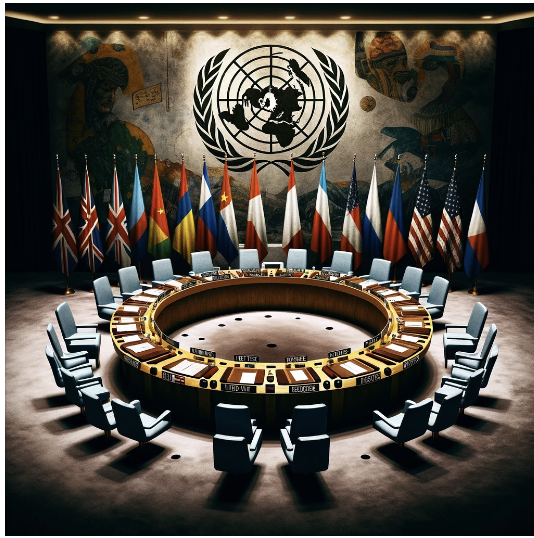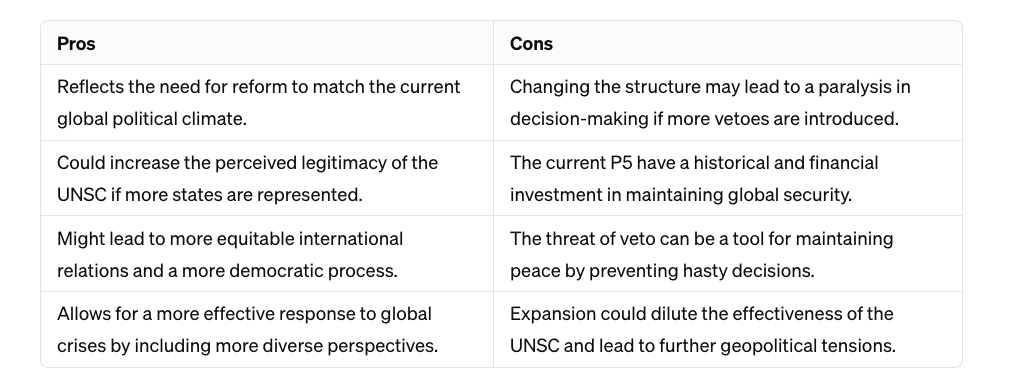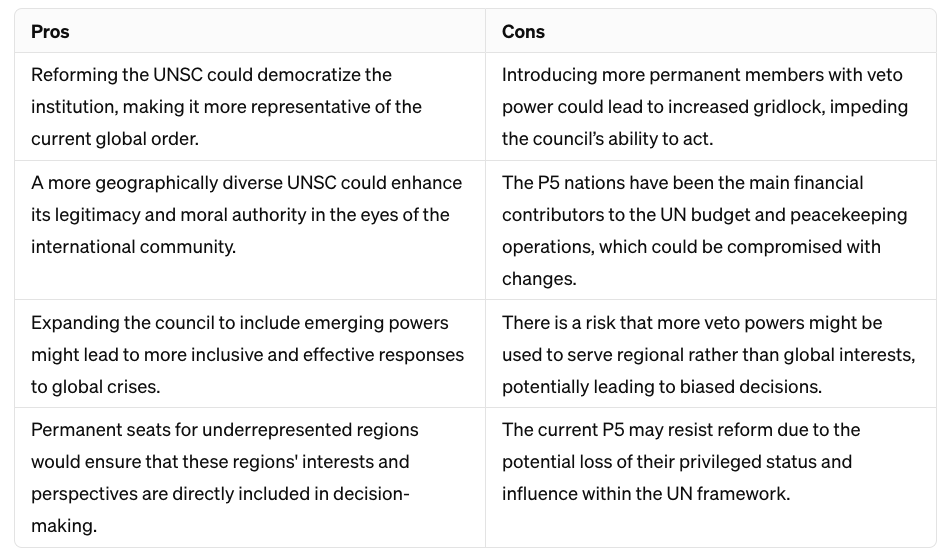Topic Note
The biggest difficulty when researching and preparing to debate this topic is that there is almost no advocacy for abolishing permanent membership in the Security Council. As a result, there aren’t any articles that argue against it. As of now, I’ve only found one article advocating the resolution, and it is written by “The Sturg.”
There is literature about Security Council “reform,” but that is mostly focused on expanding temporary membership or removing the veto power.
As a result, we’ve done our best to focus on using this evidence to create arguments centered around the idea of reforming the Security Council, strengthening it, and reforming it. Some of these are based on the overall strength of the UN.
We’ve added related files on imperialism and hegemony to the evidence release.
The Resolution
United Nations
The United Nations (UN), established in 1945 in the aftermath of World War II, serves as a global platform aimed at fostering international cooperation and ensuring peace and security among nations. With 193 member states, the UN operates on foundational principles such as the sovereign equality of all its members, non-interference in the internal affairs of states, and the peaceful resolution of disputes. Its primary objectives include the maintenance of international peace and security, the promotion of human rights, the delivery of humanitarian aid, the advancement of sustainable development, and the upholding of international law. Through its various organs like the General Assembly, the Security Council, and specialized agencies such as WHO and UNESCO, the UN strives to address complex global challenges, from conflict resolution and peacekeeping to environmental sustainability and human rights advocacy.
Security Council
The United Nations Security Council (UNSC) is one of the six principal organs of the United Nations, charged with the paramount responsibility of maintaining international peace and security. Established in 1945 by the UN Charter, the UNSC is empowered to make decisions that member states are obligated to comply with, making it the only UN body with the authority to issue binding resolutions. Its goals encompass the prevention and removal of threats to peace, the suppression of acts of aggression or other breaches of peace, and the promotion of peaceful resolutions and adjustments to international conflicts or disputes. The Council plays a crucial role in peacekeeping operations, sanctions regimes, and the authorization of military action when necessary to maintain or restore global peace and security.
The UNSC consists of 15 members, including five permanent members (China, France, Russia, the United Kingdom, and the United States) known as the P5, and ten non-permanent members elected by the General Assembly for two-year terms, with representation from various geographic regions. The P5 members have the power to veto, allowing any one of them to block the adoption of substantive resolutions. The Council operates through regular meetings, emergency sessions, and a variety of subsidiary bodies to address specific situations or thematic issues. Decisions on substantive matters require a minimum of nine affirmative votes and no vetoes by permanent members, reflecting the need for consensus among the world’s major powers. This structure and operation mechanism underpin the UNSC’s efforts to address complex international security issues, navigate geopolitical dynamics, and foster an environment conducive to peace and cooperation.
“Abolish Permament Membership”
There are a number of ways that “abolish permanent membership” could be understood and what each interpretation might entail:
Interpretation #1: This could mean removing the current five permanent members (P5) – the United States, the United Kingdom, France, Russia, and China – from their positions of permanent status, leaving no countries with permanent seats.
Entailment: It would democratize the decision-making process, potentially making it more reflective of the international community’s views. However, it might also lead to a less stable and predictable Security Council, as the absence of permanent members could result in fluctuating commitments and priorities.
Interpretation #2: Replacing Permanent Membership with a Rotational System
Interpretation: Instead of having fixed permanent members, seats could rotate among UN member states based on certain criteria, such as regional representation or contributions to UN missions.
Entailment: This could lead to a more inclusive and equitable system, allowing for greater representation of different regions and countries. However, it may also result in less experienced countries being part of crucial decision-making processes, potentially affecting the effectiveness of the UNSC.
Introducing New Permanent Members
Interpretation #3: Permanent membership could be made conditional on certain criteria, such as human rights records, contribution to peacekeeping efforts, or adherence to international law.
Entailment: This approach could incentivize positive global behavior but might also politicize the criteria for permanent membership and lead to disputes over assessments and qualifications.
How will debaters interpret this?
I don’t think #3 will be acceptable, as it sounds too much like a plan.
Number 2 is possible, but it has plan-sounding elements.
Number 1 is clearly the most topical, though debaters may say that the likely result of the action in #1 is the rotational system placed in #2. The only other alternative would be the abolition of the Security Council, which is not what is being debated.
*Pro Arguments
The Key to Security Council Reform Is Fewer Permanent Members, Not More
Eliminate The Permanent Membership of the UN Security Council
General Arguments
In this section, we will discuss some general arguments in favor of Security Council reform. In the next section, we will discuss some potential arguments for specific membership changes, such as the advantage of Germany getting a seat.
Outdated power structures. In the aftermath of World War II, the United Nations Security Council (UNSC) was established as a pivotal mechanism to maintain international peace and security. It was granted five permanent members (P5) — the United States, the United Kingdom, France, Russia (succeeding the Soviet Union), and China — who were afforded a permanent seat and the consequential power of veto. These nations were chosen for their significant roles in the post-war global order and were entrusted with the responsibility to oversee and maintain worldwide stability.
The use of the veto in an arbitrary manner has challenged the credibility of the Council and contributed to its paralysis in addressing global crises. This structure no longer reflects the new power structures in the world today, and the legitimacy of the UNSC is eroded when permanent members use their veto power to protect client states or themselves from scrutiny
As the 21st century unfolds, the global power landscape has evolved dramatically, and the once clear-cut dominion of the P5 no longer mirrors the current geopolitical realities. Nations like Germany, Japan, India, and Brazil have risen as major economic and political forces, challenging the historical status quo. The UNSC’s static structure is increasingly viewed as a relic, unsuitable for today’s diversified international arena, and its legitimacy is called into question. Criticism mounts over instances where the P5 exploit their veto power to shield themselves or their client states from international scrutiny or intervention, even in situations that may demand a response for the sake of global security or the protection of human rights. This practice of veto use, arguably, serves more to safeguard the P5’s own geopolitical interests than to address and resolve pressing global issues, suggesting a need for reform in the UNSC’s power dynamics. (Kelly, 2020).
Diversity and representation. The argument against the current structure of the UNSC centers on its heavy Western orientation, which starkly contrasts with the diverse membership of the United Nations and the contemporary global power balance. The rise of new economic and political powerhouses, particularly in regions like Asia, Africa, and Latin America, is not mirrored in the UNSC’s permanent membership.
This discrepancy has led to calls for a more equitable geographical distribution and regional representation within the council. Critics argue for the inclusion of permanent seats for underrepresented regions, notably Africa and Latin America, to ensure that the UNSC reflects the modern world’s diversity and complexity. The current system is perceived as imbalanced, with the P5 wielding veto power that can be, and has been, used to safeguard their own interests or those of their client states, sometimes at the expense of addressing critical global issues. This practice raises questions about the legitimacy of the UNSC and its effectiveness in upholding international peace and security.
Source: Decolonizing the United Nations Means Abolishing the Permanent Five
The lack of permanent seats for regions such as Africa and Latin America means that over a billion people do not have equitable influence in critical decisions that affect global stability and their own regional security. This imbalance diminishes the council’s legitimacy and perpetuates a system of global governance that is misaligned with the democratic values it seeks to promote. And important challenges unique to underrepresented regions may not receive the attention they deserve, such as regional conflicts, development needs, and specific security threats. Moreover, the veto power, held exclusively by the P5, can be used to block collective action even when there is widespread international consensus, allowing for the perpetuation of injustices and conflicts. The current structure fails to address these shortcomings, leaving pressing issues in some of the world’s most vulnerable regions unaddressed and unresolved. This is why the loss of diversity in representation within the UNSC is more than a procedural oversight; it is a substantive failing that calls into question the council’s role as a guardian of global peace and equity. (UN 2022).
Innifectiveness. The Security Council’s performance and legitimacy continue to suffer without structural reform. Its inability to agree on a unified position on major crises, such as Russia’s invasion of Ukraine and the Israel-Palestine conflict, has underscored the urgency of reform. (UN). If abolishing permanent members results in more members, this problem could worsen.
Potential for Increased Gridlock. The proposal to eliminate permanent membership or to significantly alter the Council’s structure raises concerns about increased complexity and reduced transparency. For instance, the Uniting for Consensus proposal suggests a 26-seat Council with long-term seats distributed among regional groups, which could make the Council’s decision-making process more cumbersome and less transparent (UN 2020).
Regional Power Imbalances. Granting seats to certain countries could exacerbate regional power imbalances and tensions. For example, in the European Union, giving Germany a permanent seat could skew the power balance and weaken the position of other medium-sized powers like Italy and Spain. (Lund 2010)
Undermining Regional Representation. The addition of new members could undermine the concept of regional representation if those members are seen as representing only their national interests rather than the interests of their region as a whole (Lund)
Challenges to Collective Measures. The Security Council’s inability to agree on resolutions can lead to a reliance on the General Assembly for recommendations, which, while carrying political weight, do not have the binding force of international law and may not be as effective in maintaining or restoring security (Schaefer)
More Resources
UN Security Council Reform: What the World Thinks
India
Despite being a major contributor, why no permanent UN Security Council seat for India?
General
Permanent membership of the UNSC is another story
.




